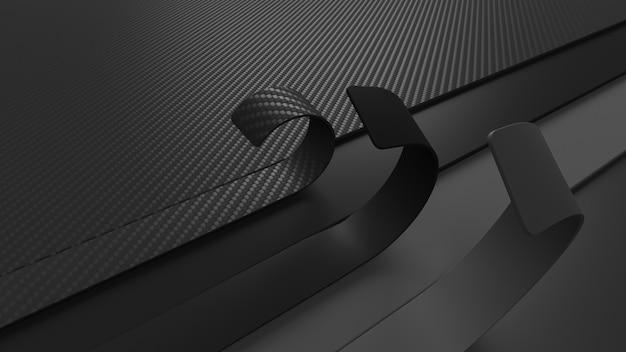When it comes to strength and performance, two materials that often come into comparison are titanium and carbon fiber. Both are considered high-performance materials and have their own unique set of properties. In this blog post, we will delve into the debate of whether titanium is stronger than carbon fiber.
Carbon fiber has long been hailed as one of the strongest materials in the world, known for its exceptional strength-to-weight ratio. It is commonly used in aerospace, automotive, and sporting industries. On the other hand, titanium is renowned for its strength, durability, and resistance to corrosion. It has been widely utilized in various applications, including medical implants and high-performance bicycles.
In this article, we will examine the properties of titanium and carbon fiber, compare their strengths, explore their uses in different industries, and ultimately determine which material comes out on top. So, if you’re curious about which material reigns supreme in the battle of strength, keep reading, and let’s find out.
Is Titanium Stronger Than Carbon Fiber
If you’re a fan of superheroes, you probably dream of having a suit made of indestructible material. But in the real world, we have to settle for options like titanium and carbon fiber. So the burning question is, which one is stronger? Let’s dive into the world of materials and find out!
Understanding the Battle of Materials
Titanium: The Warrior’s Choice
First up, we have titanium – the heavyweight champion of the metal world. Known for its exceptional strength-to-weight ratio, this element is a true force to be reckoned with. It’s used in various applications, from aerospace to medicine, thanks to its incredible durability and resistance to corrosion.
Carbon Fiber: The Lightweight Contender
Enter carbon fiber, the agile contender in this battle. Made of thin strands of carbon woven together, this material is not only lightweight but also impressively strong. Its popularity has skyrocketed in recent years, finding its place in industries like sports cars and even aerospace engineering.
An Epic Showdown: Strength Test Time!
Round 1: Weight
In the world of materials, weight matters. Titanium boasts an impressive strength-to-weight ratio, making it a favorite among engineers and designers. Carbon fiber, on the other hand, takes this round as it is significantly lighter than titanium, giving it an advantage in applications where weight is a critical factor.
Round 2: Tensile Strength
When it comes to tension, where materials are pulled apart, both titanium and carbon fiber shine. Titanium’s strength rivals that of steel, making it a tough competitor. However, carbon fiber takes home the victory this time, offering an even higher tensile strength and exceptional resistance to bending and breaking.
Round 3: Impact Resistance
Imagine your indestructible superhero suit getting hit by a speeding train – ouch! That’s where impact resistance comes into play. In this round, carbon fiber once again proves its mettle. Its ability to absorb and distribute impact energy far surpasses that of titanium, making it an optimal choice for applications where durability is paramount.
The Verdict: A Tie Depends on the Application
As the dust settles on this epic battle, we find ourselves without a clear winner. Both titanium and carbon fiber have their strengths, and the victor heavily depends on the application at hand. If you need a lightweight material, carbon fiber is the way to go. But if strength and durability are your top priorities, titanium takes center stage.
So, dear readers, the age-old question of whether titanium is stronger than carbon fiber remains unanswered. But fret not! Instead of choosing one over the other, we can appreciate the unique qualities and advantages each brings to the table. After all, as the saying goes, “With great materials, come great engineering possibilities!”
Stay tuned for more thrilling battles in the world of materials. Until then, keep dreaming of your superhero suit and remember – both titanium and carbon fiber can make you feel invincible, even if it’s just in your imagination!
FAQ: Is Titanium Stronger Than Carbon Fiber
Is carbon fiber the strongest material?
Carbon fiber is indeed one of the strongest materials available. It boasts an exceptional strength-to-weight ratio, making it a preferred choice in various industries. However, it’s important to note that the term “strongest material” can be subjective as different materials excel in different applications.
What is the strongest material in the world?
When it comes to pure strength, graphene steals the limelight. Graphene, a single layer of carbon atoms arranged in a two-dimensional lattice, holds the title of being the strongest material known to mankind. Its incredible strength and versatility have sparked immense interest in the scientific community.
Is a titanium bike better than carbon?
While both titanium and carbon fiber bikes have their merits, the better choice depends on individual preferences and riding style. Titanium bikes are known for their durability, smooth ride quality, and resistance to corrosion. On the other hand, carbon fiber bikes offer excellent stiffness, lightweight construction, and vibrations absorption. Ultimately, it’s a matter of personal preference and specific riding needs.
What material is stronger than carbon fiber?
As mentioned earlier, graphene stands out as one of the strongest materials, surpassing the strength of carbon fiber. However, it’s important to consider that graphene is not yet widely used in practical applications, as its production and implementation still pose significant challenges.
Why is carbon fiber so expensive?
The price of carbon fiber can be attributed to several factors. Firstly, the manufacturing process involves intricate steps and requires specialized equipment, resulting in higher production costs. Additionally, the raw materials used in carbon fiber production, such as polyacrylonitrile (PAN), are not cheap. Lastly, the demand for carbon fiber is relatively high, which can further drive up its price.
Should I buy a carbon fiber mountain bike?
If you’re an avid mountain biker looking for a high-performance bike, a carbon fiber mountain bike can be an excellent choice. Carbon fiber offers impressive stiffness, which translates into better power transfer and improved handling on rough terrains. However, it’s worth noting that carbon fiber bikes may come with a higher price tag compared to other materials.
Can carbon fiber stop a bullet?
Carbon fiber alone is not designed or intended to be bulletproof. While carbon fiber composites possess excellent strength properties, they lack the necessary characteristics to stop projectiles. Bulletproof applications usually involve specialized materials, such as Kevlar or bullet-resistant glass, which are specifically designed for ballistic protection.
Does Titanium get rusty?
Contrary to popular belief, titanium is highly resistant to corrosion and does not rust in typical environmental conditions. It naturally forms a protective oxide layer that prevents rust or deterioration. This property makes titanium an ideal choice for applications where exposure to moisture or harsh environments is a concern.
Can a car be made of carbon fiber?
Yes, cars can indeed be made of carbon fiber. In fact, many high-performance sports cars and supercars incorporate carbon fiber components to reduce weight, enhance performance, and improve fuel efficiency. Carbon fiber’s strength and lightweight properties make it an enticing choice for automotive applications, albeit at a higher cost compared to traditional materials.
How long will a carbon fiber bike last?
The lifespan of a carbon fiber bike varies depending on various factors, including the quality of construction, usage, maintenance, and riding conditions. With proper care and maintenance, a well-made carbon fiber bike can last for many years, even surpassing a decade. Regular inspections, proper cleaning, and addressing any damages promptly are crucial for maximizing the longevity of a carbon fiber bike.
Can an engine be made of carbon fiber?
Although carbon fiber is not typically used to construct entire engines, certain engine components can benefit from carbon fiber’s properties. For example, carbon fiber can be used for engine covers, air intake systems, or even connecting rods in high-performance applications. The lightweight nature and strength of carbon fiber can enhance engine performance and reduce overall weight.
Why are carbon fiber bikes so expensive?
The price of carbon fiber bikes can be attributed to the costly manufacturing processes, the high-quality materials used, and the technology advancements involved. Constructing carbon fiber frames and components requires specialized skills, expensive molds, and advanced machinery. Additionally, carbon fiber itself is a costly raw material. However, it’s important to note that as technology evolves and production methods improve, the prices of carbon fiber bikes are gradually becoming more accessible.
Is carbon fiber worth the money?
The decision of whether carbon fiber is worth the money depends on individual preferences and priorities. Carbon fiber’s lightweight construction, stiffness, and vibration absorption attributes can significantly enhance riding experience and performance. If these aspects are important to you and align with your budget, investing in a carbon fiber bike can be a worthwhile choice.
Can you make a car out of carbon fiber?
Yes, carbon fiber has been widely used in the automotive industry, particularly in the production of high-performance vehicles. The use of carbon fiber in car manufacturing offers benefits such as weight reduction, increased fuel efficiency, improved handling, and enhanced safety. However, due to the high cost of carbon fiber, its extensive use in mass-market vehicle production is currently limited.
Is Kevlar stronger than carbon fiber?
While they possess different properties, it’s challenging to directly compare Kevlar and carbon fiber in terms of strength. Kevlar, a highly durable and abrasion-resistant material, excels in applications requiring impact resistance and protection against penetration, such as bulletproof vests. Carbon fiber, on the other hand, offers exceptional stiffness-to-weight ratio, making it ideal for applications that prioritize lightweight and high strength.
Is Titanium lighter than carbon fiber?
When comparing weight, carbon fiber reigns supreme. Carbon fiber is renowned for its exceptional strength-to-weight ratio, allowing for lightweight construction that doesn’t compromise on strength. Titanium, although lightweight compared to many other metals, is generally heavier than carbon fiber. However, it’s essential to consider the specific application and the desired trade-offs between weight and other factors.
Is Titanium more expensive than carbon fiber?
In most cases, titanium is more expensive than carbon fiber. The higher cost of titanium can be attributed to the scarcity of the metal, as well as the intricate and demanding manufacturing processes involved in transforming it into usable forms. On the other hand, while carbon fiber is relatively costly, it generally offers more affordability compared to titanium.
What car has the most carbon fiber?
Several high-performance vehicles incorporate significant amounts of carbon fiber in their construction. Notable examples include the iconic Bugatti Veyron and Chiron, McLaren P1 and 720S, and the Ferrari LaFerrari. These cars utilize carbon fiber extensively to reduce weight, improve aerodynamics, enhance performance, and create a visually stunning appearance.
Does carbon fiber break easily?
Carbon fiber possesses exceptional strength properties, making it highly resistant to breakage under normal circumstances. However, like any material, carbon fiber does have its limits. Excessive impact or force can cause structural damage or even result in breakage. It’s essential to handle and use carbon fiber products with care, avoiding situations that could subject them to unnecessary stress or impact.
Why do titanium bikes have carbon forks?
The combination of titanium frames with carbon forks is a popular choice in the cycling world due to the advantages it offers. Titanium frames excel in durability, providing a smooth and comfortable ride, while carbon forks enhance vibration absorption and improve overall performance. This combination creates a balance between strength, comfort, and responsiveness.
Is carbon fiber the future?
Carbon fiber’s immense potential and versatility make it a promising material for various industries, including automotive, aerospace, and renewable energy. As technology continues to advance and production costs decrease, carbon fiber is likely to become more prevalent in everyday applications. Its lightweight and robust properties position it as a strong contender for the future of materials.

